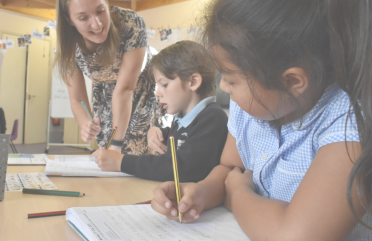By Louise Jennings, Head of Early Years Services and Michelle Nicholson, Lead Teaching and Learning adviser, Primary English
Writing is an entirely artificial human construct and a skill so complex that many of us spend a lifetime perfecting it. Our innate desire for self-expression and communication drives us towards mastery; social beings have a strong need to interact with peers and the environment.
Children begin their writing journey long before they enter the education system. From the day they open their eyes and experience the world, hear speech and respond to sounds, they start locking in the language they need to replicate. As they grab objects, use words and build core muscle strength, they develop the vital skills to record that language as writers.
As carers and educators, we can shape that journey and guide children along the most effective route.

To develop confident and joyful young writers, adults need to design and provide opportunities to enhance children’s communication and language. Daily conversations, compelling storytelling and role-play activities inspire and support children to communicate through speech and print.
Learning to read is also vital. Through sharing rich and varied stories, children internalise the language structures that writers use to engage and entertain. They are introduced to various story shapes, structures, vocabulary and rhythms of literary language. Signs, letters, lists and instructions show children that print is used and valued by others. Seeing children like themselves represented in books assures them that their voice and experiences are equally valid to share.
Expressive language tends to arise verbally. Then comes the joy of realising that ideas can be presented and shared on a surface – whether paper, sand or the playground floor. Early writing begins with children making dots and swirls that gradually take the form of letters.
This complex process requires support and encouragement from adults. As children grasp how print works in communication and expression, we need to build their confidence by providing a genuine audience. Giving them opportunities to write about what matters to them is a hugely motivating factor.
The physical skills and knowledge that lay the foundations for later writing success must be introduced systematically, modelled frequently and practised continuously.
However, a recent Ofsted report, “Strong foundations in the first years of school”, highlighted that “Schools’ curriculums for English – and literacy in the early years – beyond the teaching of phonics, are often weak.” It reported that schools introduce complex writing tasks too early and do not give children enough time, teaching and practice to become confident in skills such as orally composing sentences and holding a pencil correctly.
For children to mark-make and write, they require physical strength and manual dexterity. The lumbrical muscles in the fingers, still developing in young children, are responsible for holding a writing tool and controlling writing. To employ these fine motor movements, the children also need stability and strength in their body, shoulders, arms, wrists and hands.
Activities such as climbing, ribbon waving and bike riding develop core strength and gross motor skills. Manipulating dough, threading cotton reels and using scissors are vital to developing fine motor skills. Young hands need to work with chunky crayons, big paintbrushes and giant markers to build readiness for managing slender pencils. Immature fingers typically draw a vertical stick line two years before a diagonal line.
Even holding a writing implement correctly is a skill that needs to be mastered. An incorrect or awkward grip strains the wrong muscles and can lead the writer to tire quickly. Correct posture is also crucial. The first handwriting objective in the Year 1 curriculum is that children should “sit correctly at a table, holding a pencil comfortably and correctly”.
As children develop handwriting control, they also study spelling. Encoding (recording) sounds takes longer to master than decoding (reading). As they move through school, children need plenty of opportunities to rehearse spelling and revisit words and patterns taught in Reception. These early spellings represent the highest-frequency words, so mastering them is essential before tackling more complex learning.
Early Years staff lay the cornerstones of all writing knowledge that children take across the curriculum. Even without the legacy of Covid, there will always be gaps in learning, so any strong curriculum should constantly revisit key learning and make it stronger. This learning is central to everything, and if we don’t build strong foundations, we risk heaping new learning on to shaky or non-existent footings.
As children move through school, we need to remember that the skills and knowledge introduced early on are core to learning and may be tricky to embed. Revisiting these means reteaching, not just rehearsing or a cursory glance backward. Good practices should be kept and not abandoned. For example, oral rehearsal of a sentence before writing is effective for all pupils, especially as sentence structures become more complex.
Building and securing foundational knowledge allows children to grow in confidence and see success in writing. A strong curriculum prioritises core skills in oracy, reading and writing. It also introduces meaningful experiences and rich literature, upon which children can develop their writing and see themselves as lifelong writers.
Questions for leaders and governors to consider:
- How does the curriculum prepare children for writing, building core strength and manual dexterity, developing language experiences and providing rich literary models?
- Does the school’s writing curriculum prioritise foundational learning and revisit it regularly?
- Does the curriculum account for children’s varied starting points, securing core skills and closing gaps in knowledge before moving on to more complex learning?
- Is the curriculum overloaded with activities that distract from key learning, preventing opportunities to prioritise and practice core skills?
- Does the writing curriculum build children’s confidence and self-belief as a writer?
Join us for our free ESSENTIALwriting for Early Years webinar on Tuesday 6th May 2025.
Learn more about ESSENTIALWRITING.

